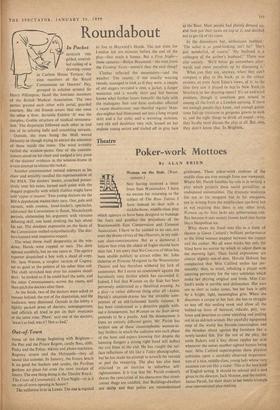Theatre
Poker-work Mottoes
By ALAN BRIEN
NOT having received a letter from Sam Wanamaker, I have no excuse• for returning to the subject of The Rose Tattoo. I have instead to deal with a middle-brow, middle-class play which appears to have been designed to bandage the fears and poultice the prejudices of the Bournemouth East Conservative and Unionist Association. I have so far yielded to no one, not even the drama critics of the Observer, in my mili- tant class-consciousness. But as a democrat I believe that even the oldest of fogies should have their fun. I am sorry that NO Concern of Mine has been unable publicly to attract either Mr. John Osborne or Princess Margaret to the Westminster Theatre and has therefore withered for lack of sustenance. But I nurse no resentment against the harmlessly cosy thriller which has succeeded it. Indeed, I feel that Woman on the Stair has been perversely underrated as a theatrical evening. As a play—a rather different thing after all—James Parish's situation-drama has the invisible com- petence of an old-fashioned family retainer. It has been condemned as a detective puzzle with- out a denouement, but Woman on the Stair never pretends to be a puzzle. And the denouement is from an entirely different genre. Mr. Parish has written one of those claustrophobic woman-at- bay thrillers in which the audience sees each phase of the hunt and enjoys knowing that despite the looming dangers a strong right hand will deflect the evil blow in the end. He has caught the sur- face reflections of life like a Taller photographer, but he has made no attempt to scratch the varnish or peel the veneering. The play has also been criticised as an exercise in suburban self- righteousness. It is true that Mr. Parish evidently shares the conviction of his characters that street- corner thugs are coddled, that Buildings-dwellers are shifty and that police are misunderstood gentlemen. These poker-work mottoes of the middle class are true enough from one viewpoint. Where Mr. Parish fumbles his role is in writing a play which projects these social partialities as undisputed universalities. The dramatic weakness lies not in his snugness but in his smugness, not in writing from the middle-class eye-level but in not realising that there is any other level, Woman oil the Stair lacks any subterranean con- flict because it sees society frozen hard into layers like a Neapolitan ice.
What thaws the fossil into life as a hunk of theatre is Gwen Catford's brilliant performance as the blind woman trapped between the copper and the cosher. We all wear masks but only the blind have no mirror by which to adjust them to the morning light. Their facial expressions are always slightly out-of-date. Harold Hobson has complained that Miss CatfOrd smiles too per- sistently; thus, as usual, rebuking a player with unerring perversity for the very subtleties which make her playing original and fresh. Miss Cat- ford's smile is terrible and defenceless. Her ears are as alert as radar cones, but her face is split by a bright, tight, meaningless grin. When she discovers a corpse' at her feet, she has to struggle to tear off this smiling mask and allow all the bottled-up fears of betrayal, ridicule, pity, vio- lence and desertion to come whistling and jostling out in an eldritch scream. Her carefully signposted map of the world has beconie ;meaningless and she thrashes about against the furniture like a newly-landed fish. For the rest of the play, the smile flickers and a tiny shiver ripples her skin whenever she senses another sighted human being near. Miss Catford superimposes these physical subtleties upon a carefully observed impersona- tion of a nice, middle-class, young lady whose very niceness can cut like a razor., This is the best kind of English acting. It should be saluted and a nod given to the director, Jack Minster, and the author, James Parish, for their share in her lonely triumph over conventional play-making.










































 Previous page
Previous page